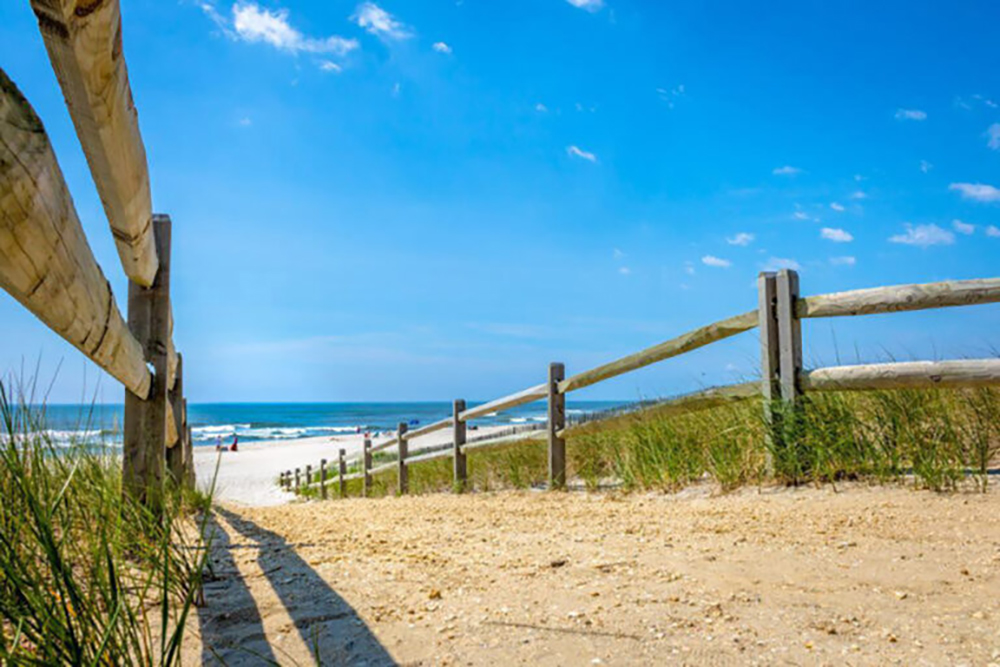By Sarah Fertsch
Staff Writer
New Jersey is the most expensive state to go to the beach. Only a handful of beach towns let patrons enjoy the shore for free, and the rest require infamously-annoying beach tags.
For most beachlovers, acquiring a beach tag means another line item on the vacation budget and a brief stop at the municipal window. You’ll flash the pin to sunglasses-clad teenagers, and you’ve finally made it.
For others, it’s just frustrating. One hundred years ago, the beach wasn’t this commercialized. Maybe you are pinching pennies and need to vacation on a tight budget. Natural spaces should be free, right? You shouldn’t have to run in to the ocean to avoid tag enforcement. Is crawling under the boardwalk still a possibility?
Purchasing beach tags has changed significantly in the past 10 years, and with a little convincing, you might be in favor of tags, too.
Here are five reasons why you should buy beach tags with a smile:
- It’s Fair
Let’s consider city funding. Local taxes, specifically property taxes, are poured back into the city budget. Therefore, home owners will be forking up almost all government services, including lifeguard protection, recreational events, and good schools. In Ocean City, the town budget supports the Ocean City Arts Center and the twice-annual Block Party.
Thousands of folks, whether they are mainlanders or daytrippers or renters, enjoy the beach every day during the summer. Shouldn’t those that use the beach support the beach, not just those who own homes? Like paid parking, cities can collect revenue from those who visit the city, not just property owners.
- Beaches Are Protected
The sand and surf are money-makers for the city, so the city is motivated to keep the beaches clean and accessible. Some shore towns dedicate profit earned from beach tags to direct support of the beaches themselves, mainly through beach replenishment, flood prevention, cleanliness and safety. On the other hand, because free beaches are free, the associated city has less resources (and motivation) to preserve the space.
- Assurance of Public Access
The application of beach tags implies that the beach is city property. In America (particularly on the East Coast), if land is not claimed, it will be bought. If the beach were free, it’s possible that the beaches are not owned or operated. Potentially, developers could build oceanfront mansions along the beach, or mark the space for expensive resorts. Because cities like Avalon operate and regulate the beach, it remains available for public recreation and enjoyment (with the unlikely possibility that the city could sell the lucrative beach lot to developers in the future). State parks like Corson’s Inlet are free for park goers thanks to state wildlife funding, but few other beaches have that level of support.
- It’s Good for the Economy
Consider how many seasonal jobs are created by the implementation of beach tags. Selling and enforcing beach tags creates seasonal work for locals, from beach attendants to enforcement officers, contributing to employment opportunities within the community. Also, by creating a sense of exclusivity, beach tags can attract more tourists, which in turn boosts local businesses like restaurants, shops, and hotels.
- Paying Premium
Speaking of premium, beachgoers can expect a high-quality product in exchange for their financial investment. These beaches may also provide more exclusive features, like organized events, beach chairs, and umbrellas for rent, or designated areas for sports and activities. As a result, tag-required beaches are often less crowded and more secure, attracting visitors who are willing to pay for a cleaner, more comfortable, and enjoyable beach experience.

Beach Tags Have Jersey Roots
Beach tags were first invented in New Jersey back in the 1930s as a way for seaside towns to manage and maintain their shores during the Great Depression. With budgets tight, local governments needed a way to fund beach upkeep without raising taxes, so they came up with the idea of charging visitors a small fee to use the beaches. This new system started in the town of Sea Girt, where officials began issuing tags to beachgoers as proof of payment. The idea caught on, spreading to other towns along the Jersey Shore. Over the decades, beach tags became a unique tradition in New Jersey, turning into both a quirky local custom and a practical solution for keeping the beaches clean, safe, and enjoyable for everyone.
Beach Tags Are Digital Now
South Jersey’s iconic beach tags have made the leap into the digital age, making it easier than ever for visitors to enjoy the region’s sandy shores. Sea Isle City has paved the way by introducing their own mobile app, My Beach Mobile, so tags can be easily accessed on smartphones. Margate has also adopted the same program, with Ventnor announcing conversion as well. The app was created by Carolina Bevad, New Jersey mother of three and avid vacationer in Wildwood Crest. The power of technology makes beach access efficient and modern.
Proposal: Towns Should Amend Rate Structures
If your blood pressure still jumps at the thought of buying beach tags, consider lobbying your local government for changes in rate structures. For example, perhaps year-round locals could get a discounted pass, or boardwalk employees could get free access as a perk? Cities like Margate offer free beach tags for veterans and active military members. If you buy beach tags during the off-season, you’ll surely pay less than midsummer. Perhaps beaches could offer intermittent free days so that everyone, no matter their economic status, can appreciate the natural beauty? If beaches don’t require tags during shoulder season, we could attract more out-of-towners to stay at local hotels and purchase meals and save on beach tag fees.
The Future of Beach Tags
Gone are the cash-only payments! As mentioned earlier, beach tags are going digital. More and more shore towns are using mobile apps (similar to Ticketmaster) for patrons to pay for tags through debit and credit cards, and even Apple Pay. Taggers don’t need to only visually validate the tags, they could also scan barcodes. This would allow cities to aggregate data on the types of passes purchased and amount of beachgoers per day.
Cities could even apply surge pricing, so that holidays like the Fourth of July are more expensive than weekdays in May. This would allow municipalities to earn more revenue and control crowds through financial incentives. Further, cities could cap beach tags, meaning that if one family purchases a week of beach tags, they might be able to get a second week of tags for free. And if tourists get an extra week on the beach, perhaps they’ll extend their trip!
Conclusion
Beach tags get a bad reputation. In my opinion, we shouldn’t direct our frustration at beach tags, but rather the capitalistic culture around public spaces, no matter how beautiful. The United States doesn’t subsidize the maintenance and protection of nature, and there’s a need to employ and train lifeguards, remove trash, and when a whale washes up, bury the creature and reset the beach for public use.
If this argument has not changed your mind on beach tags, visit a free beach! Strathmere, Atlantic City and the Wildwoods are completely free for beachgoers. Enjoy the natural wonder of the Jersey Shore.
So when you inevitably purchase a beach tag, don’t think too much about the tag itself. Envision a clean city with concerts on the sand with a long and successful future. And perhaps that beach tag will make for a cute ornament or collector’s item when that future gently arrives.












